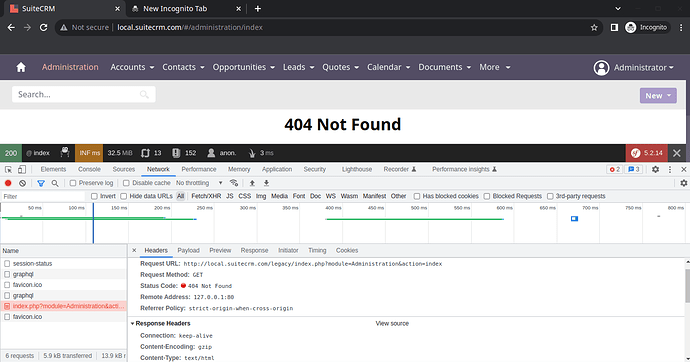I installed fresh instance of SuiteCRM-8.1.3 on local environment Linux, after installation i login to Suitecrm but unable to access Admin and Home module. I followed instructions given on Community, but couldn’t get any success.
Hey!
hmmm, From your screenshot, it appears as though the CRM is trying to route you to:
[CRM]/legacy/index.php?module-Administration&action=index
However, I believe it should be trying to route you to:
[CRM]/public/legacy/index.php?module-Administration&action=index
I’m not 100% sure what the cause may be, but would you be able to pass over the following info?:
Your CRM’s “site_url” value?
(in the file /public/legacy/config.php)
And what you have set as your “RewriteBase”?
(in the file /public/legacy/.htaccess)
Thanks!
Sorry for late reply.
‘site_url’ => ‘http://local.suitecrm.com’, (in the file /public/legacy/config.php)
RewriteBase /public/legacy (in the file /public/legacy/.htaccess)
I also try to change site_url value and RewriteBase value multiple times,
but it doesn’t solve my problem.
I almost tried every solution present on Community regarding this, but no solution, every time same error.
Finally solve the problem. There was an issue with Virtual Host Configuration.
I am using Nginx on Debian.
Following Link helps a lot, just need to make small modifications.
And Here are my Virtual Host COnfigurations
server {
root /var/www/html/local.newcrm.com/public;
index index.php index.html index.htm;
server_name local.newcrm.com;
client_max_body_size 100M;
location / {
# try to serve file directly, fallback to index.php
try_files $uri /index.php$is_args$args;
# optionally disable falling back to PHP script for the asset directories;
# nginx will return a 404 error when files are not found instead of passing the
# request to Symfony (improves performance but Symfony's 404 page is not displayed)
# location /bundles {
# try_files $uri =404;
# }
location ~ ^/index\.php(/|$) {
fastcgi_split_path_info ^(.+\.php)(/.*)$;
include fastcgi_params;
fastcgi_pass unix:/var/run/php/php7.3-fpm.sock; # adjust to your needs
fastcgi_intercept_errors on;
fastcgi_temp_file_write_size 10m;
fastcgi_busy_buffers_size 512k;
fastcgi_buffer_size 512k;
fastcgi_buffers 16 512k;
fastcgi_read_timeout 1200;
fastcgi_param HTTP_AUTHORIZATION $http_authorization;
# optionally set the value of the environment variables used in the application
# fastcgi_param APP_ENV prod;
# fastcgi_param APP_SECRET <app-secret-id>;
# fastcgi_param DATABASE_URL "mysql://db_user:db_pass@host:3306/db_name";
# When you are using symlinks to link the document root to the
# current version of your application, you should pass the real
# application path instead of the path to the symlink to PHP
# FPM.
# Otherwise, PHP's OPcache may not properly detect changes to
# your PHP files (see https://github.com/zendtech/ZendOptimizerPlus/issues/126
# for more information).
fastcgi_param SCRIPT_FILENAME $realpath_root$fastcgi_script_name;
fastcgi_param DOCUMENT_ROOT $realpath_root;
# Prevents URIs that include the front controller. This will 404:
# http://domain.tld/index.php/some-path
# Remove the internal directive to allow URIs like this
internal;
}
# return 404 for all other php files not matching the front controller
# this prevents access to other php files you don't want to be accessible.
location ~ \.(php|key|log)$ {
return 404;
}
}
location ^~ /legacy/ {
try_files $uri $uri/ /index.php?$args;
location ~ \.(php|key|log)$ {
try_files $uri =404;
fastcgi_split_path_info ^(.+\.php)(/.*)$;
include fastcgi_params;
fastcgi_pass unix:/var/run/php/php7.3-fpm.sock; # adjust to your needs
fastcgi_param SCRIPT_FILENAME $realpath_root$fastcgi_script_name;
fastcgi_param DOCUMENT_ROOT $realpath_root;
}
}
location ~ /Api/(?!(graphql)) {
alias /var/www/html/local.newcrm.com/public/legacy; # !important
index index.php;
try_files $uri @rewrite_api;
location ~ .php {
fastcgi_split_path_info ^(.+\.php)(/.*)$;
include fastcgi_params;
fastcgi_pass unix:/var/run/php/php7.3-fpm.sock; # adjust to your needs
fastcgi_param SCRIPT_FILENAME $realpath_root$fastcgi_script_name;
fastcgi_param DOCUMENT_ROOT $realpath_root;
}
}
location @rewrite_api {
rewrite ^/Api/(.*)?$ /Api/index.php/$1 last;
}
error_log /var/log/nginx/mysuitecrm_error.log;
access_log /var/log/nginx/mysuitecrm_access.log;
}
